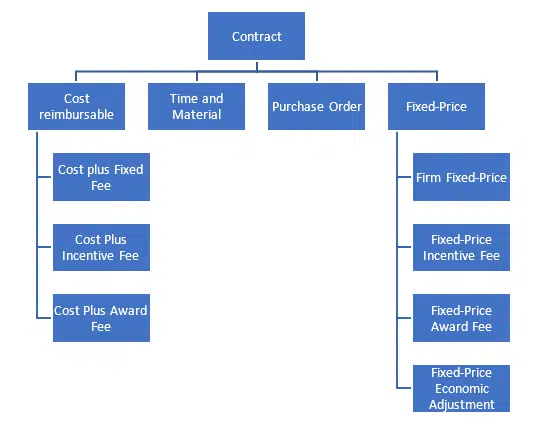What is a Firm Fixed Price Contract?
A contract is a binding agreement between the buyer and seller that obligates the seller to provide goods or services and obligates the buyer to compensate the seller for these goods or services. A contract sets expectations for all parties involved.

A fixed-price contract can be one of the following types:
- Firm Fixed-Price Contract
- Fixed-Price Plus Incentive Fee
- Fixed-Price Plus Award Fee
- Fixed-Price Economic Order Adjustment
In today’s article, I will explain the firm-fixed-price contract to you.
What is a Firm Fixed-Price Contract?
A firm-fixed-price contract is an agreement in which the seller agrees to complete a task or deliver a product or service for a set price. The cost does not change, regardless of the actual expenses incurred by the seller.
This means the seller bears the financial risk of cost overruns or unexpected expenses, while the buyer is protected from price increases once the contract is signed.
FFP contracts are used when the scope of work is well-defined, and the costs can be accurately estimated upfront. The fixed price is agreed upon during the contract negotiation, and payments are based on project milestones or deliverables.
For example, if a company hires a contractor to build a shed for 5,000 USD, the contractor must complete the job for that amount. If the contractor spends over 5,000 USD, the company must cover the extra costs.
This contract benefits buyers by providing cost certainty but can be risky for sellers if costs rise unexpectedly.
Examples of Firm Fixed-Price Contracts
A few examples of FFP contracts are:
- Construction: A company hires a contractor to build a small office for a fixed price of 100,000 USD. The contractor must complete the building for this amount—regardless of additional costs.
- Software Development: A business contracts a software developer to create a custom application for 50,000 USD. The developer agrees to deliver the completed software for this fixed price.
- Manufacturing: A manufacturer agrees to produce 1,000 units of a product for 20,000 USD. The price remains the same—even if the production costs rise.
Pros & Cons of Firm Fixed-Price Contracts
Pros
- Defined Scope: This contract provides a well-defined scope, so there is less of a chance of scope creep.
- Cost Certainty: The price is fixed, so the buyer knows the total cost, which can help with budgeting and financial planning. If the project is managed efficiently, the seller can increase profit by controlling costs.
- Efficiency Incentive: Since the price is fixed, the seller has a strong incentive to complete the project as efficiently as possible to maximize profits.
- Simplicity: FFP contracts are straightforward to understand. During the project, no complex cost tracking or adjustments are required.
- Risk Transfer: The risk of cost overruns and inefficiencies is transferred to the seller, thus protecting the buyer from unexpected costs.
- Predictable Cash Flow: Cash-flow management is predictable for both parties since payments are based on a fixed price.
Cons
- Risk for the Seller: If the project encounters unforeseen challenges, then the seller must absorb the additional costs, which can reduce or eliminate profits.
- Potential for Reduced Quality: The seller might cut corners to stay within budget, thus leading to lower quality work or materials.
- Less Flexibility: FFP contracts are less flexible. Any changes or modifications to the scope of work often require contract renegotiation, which can be time-consuming and costly.
- Possibility of Overpricing: To mitigate their risk, sellers may inflate their initial price to account for potential uncertainties, thus leading to higher costs for the buyer.
- Complex Negotiations: Negotiating the fixed price can be complex, as both parties must agree on a price while considering all potential risks and uncertainties.
- Limited Buyer Control: Once the contract is signed, the buyer has limited control over the seller’s processes and methods, which can be concerning if quality or timing becomes an issue.
FFP Application
- It is useful for construction projects.
- It is suitable for off-the-shelf products, in which a standard rate exists for price determination.
- It is suitable when definite design or performance specifications are available.
- It is suitable when the buyer does not have time to audit invoices.
- It is suitable when minimum administration is available (e.g., government buyers).
- It is suitable when the contractor is experienced or can leverage previous work to enable estimation.
Summary
Firm fixed-price contracts offer the benefits of cost certainty and efficiency incentives, which makes them ideal for projects with a well-defined scope. However, they also transfer significant risk to the seller, who must manage costs carefully to avoid financial loss. While buyers can benefit from predictable costs, they may also face reduced flexibility and potential quality concerns.
FFP contracts are best suited for situations in which both parties can estimate costs and risks accurately.
Further Readings:
- What is a Contract?
- What is Project Procurement Management?
- What are the Types of Procurement Contracts?
- What is a Fixed-Price Contract?
- What is a Time & Material Contract?
References:
This topic is important from a PMP exam point of view.


